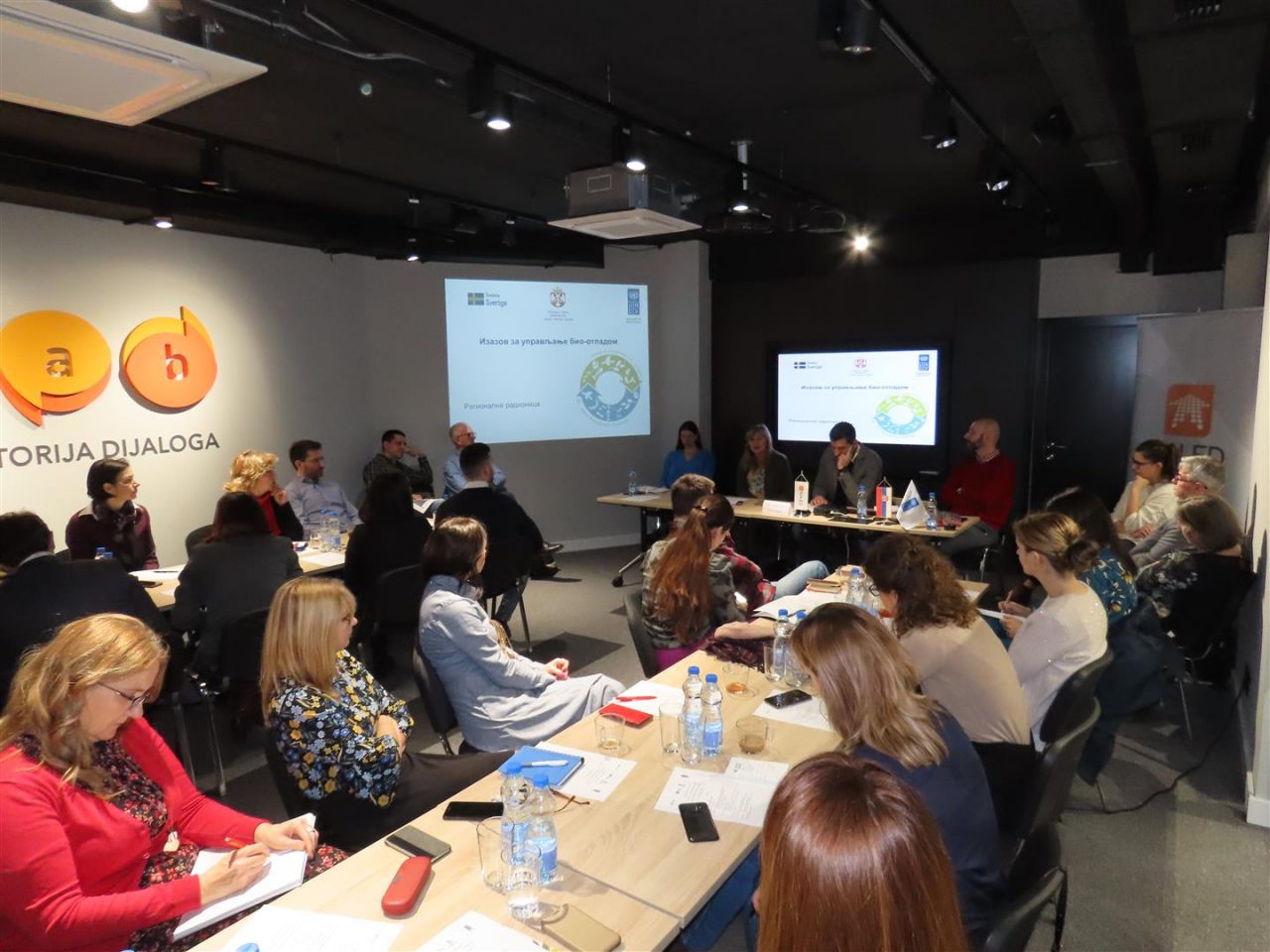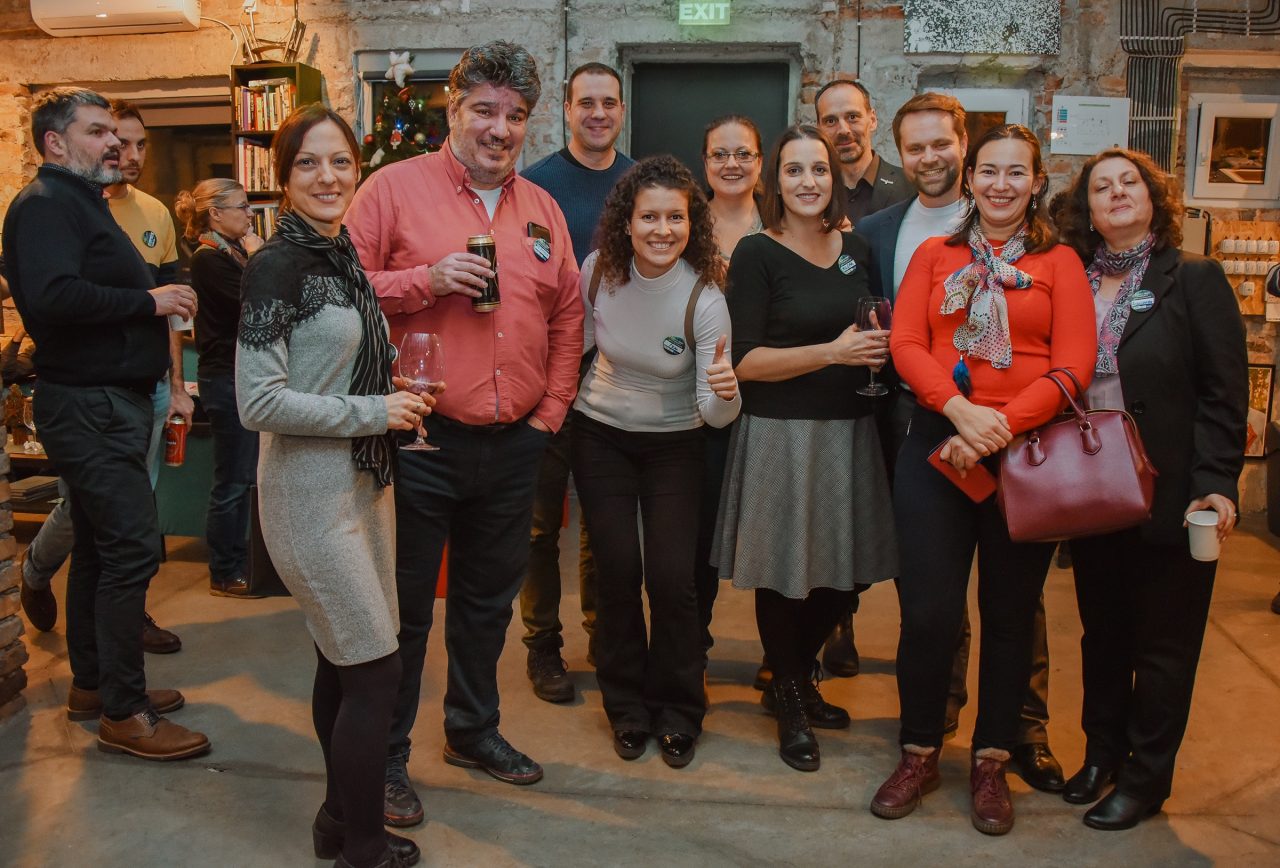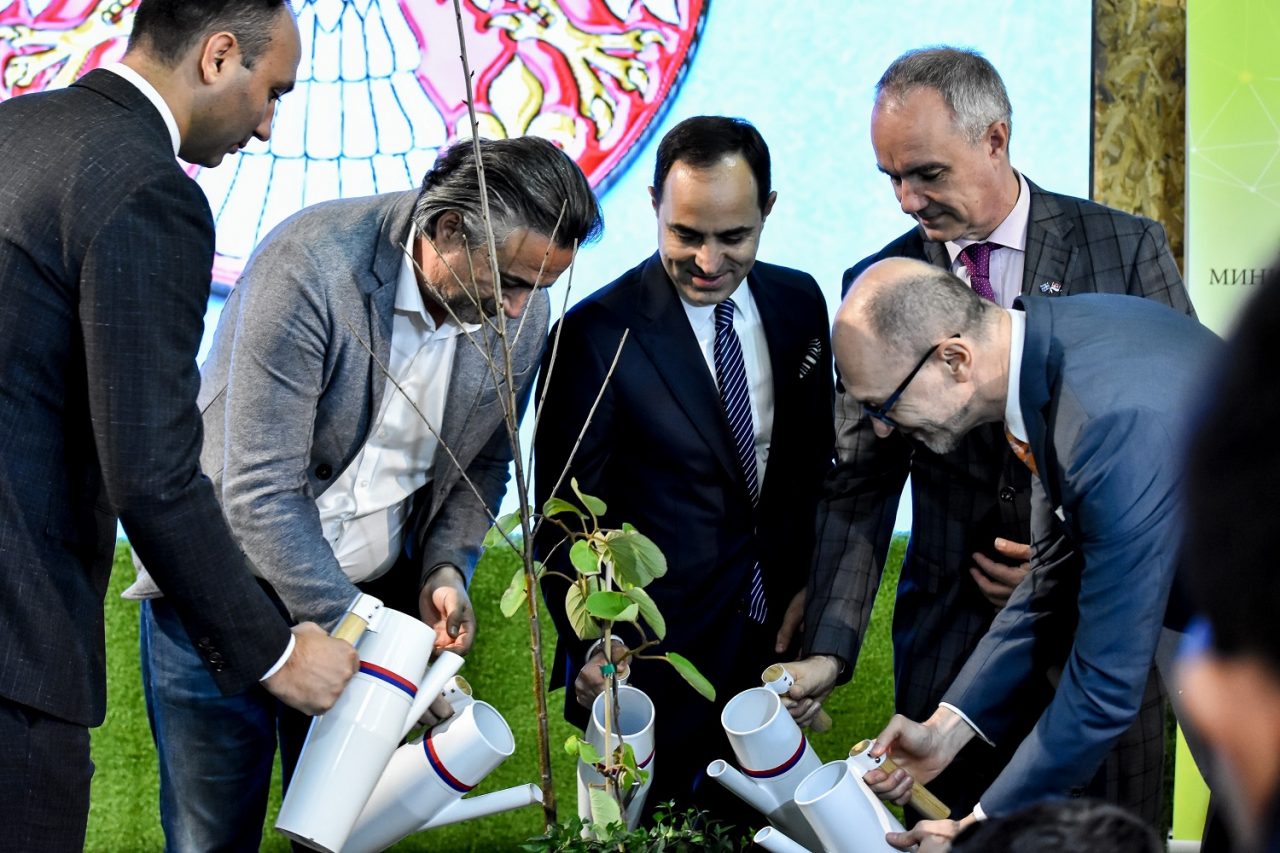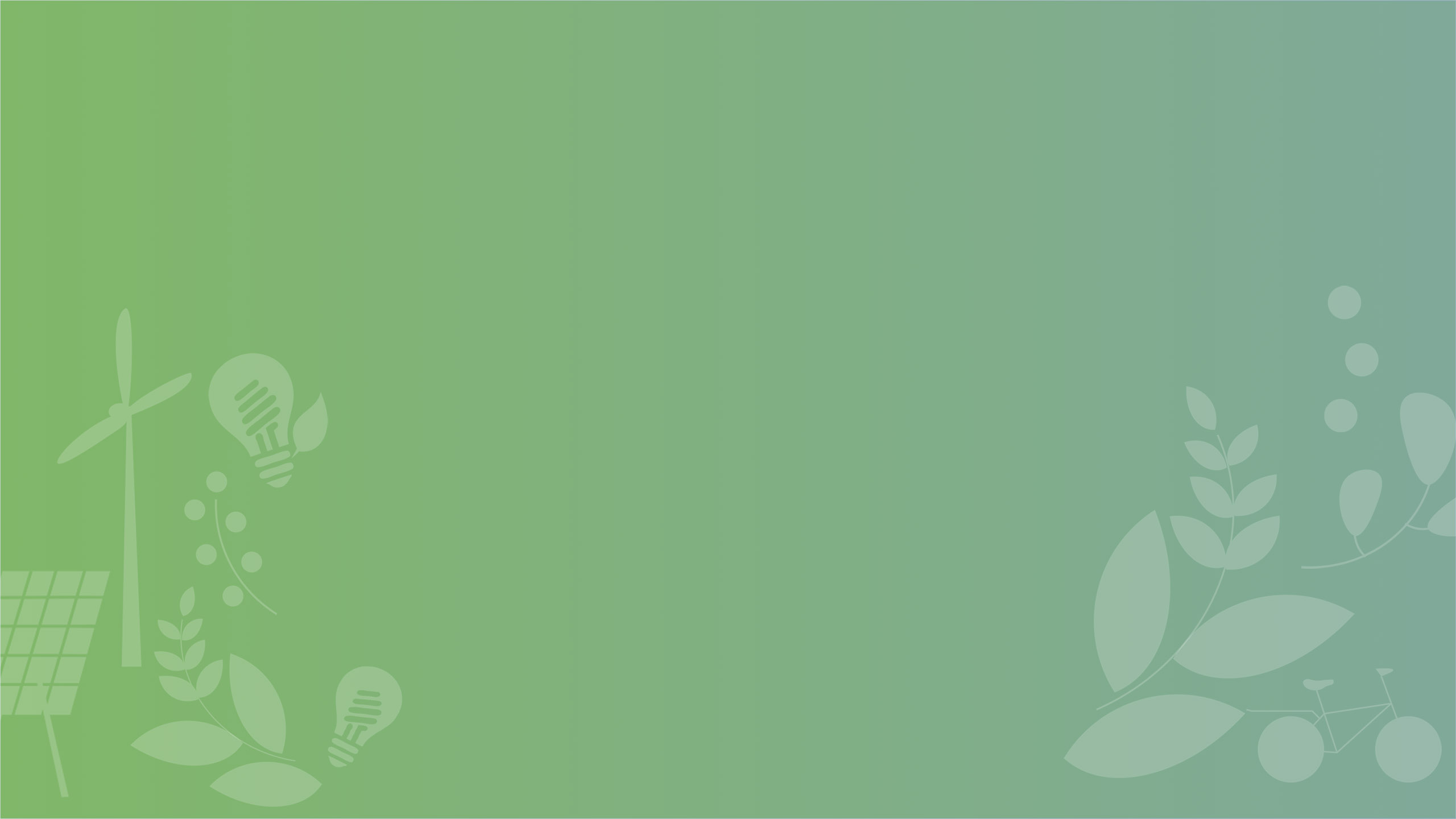-
Mar 04 2020 Regional Workshops had been held for the Public Call for the “Climate Smart Bio – Waste Management Challenge”
Public Call for the “Climate Smart Bio – Waste Challenge” had been presented at regional workshops in Niš, Novi Sad, Čačak and Belgrade. Representatives of private companies, public utilities, local governments, research and scientific institutions and non-governmental sector had an opportunity to get detail information related to Public Call, which will be open on March 10 th .
– Our idea is to involve the private sector as much as possible in solving the problem of biodegradable waste, so this type of waste does not end up in landfills and decompose into methane, a very potent greenhouse gas – said Miroslav Tadic, Portfolio Manager for Climate Change in UNDP Serbia. He added that the main goal of the project is to involve the private sector in tackling climate change through innovative, technical and technological solutions and business models.
One of the results of the project, according to Tadić, should be the introduction of the circular economy principles into bio-waste management in Serbia.
Radmila Šerović, Head of the Department for Waste Management at Ministry of the Environmental Protection announced that the new Waste Management Strategy will be available in the Serbian language by the end of February and that it will revise the goals of waste management related to bio- waste.
– In new Strategy this type of waste takes a significant place, although we do not have much information on the quantities and types of bio-waste generated in Serbia. Following EU directives, we have envisaged strategic measures to improve the management of this type of waste. Also, we will identify all producers of biodegradable waste – explained Šerović.
She said that the “Climate Smart Bio – Waste Challenge” project will facilitate the establishment of bio-waste management infrastructure, primarily its collection, separation from other types of waste and treatment, "so that even a kilo of bio-waste does not end up in landfills." As she explained, there are a small number of operators involved in bio-waste treatment in Serbia, which can be explained by the fact that this activity is not profitable.
– We have made the least progress in bio-waste management due to lack of infrastructure for waste collection and treatment. More than 60 companies have permits for collection, transportation and treatment of bio-waste, but they are not all working. The investments are highe, the industry is not profitable and that is the reason why we have not made any progress. Serbia should have at least one biogas plant in every of 26 regions. Without such plants and composting facilities, we will not be able to meet our goals. We need big investments and infrastructure based on the development of the regions – said Šerović, adding that it is a practice everywhere in the world that waste producer pays for its disposal, based on „the polluter pays“ principle.
Project Coordinator Ana Seke explained that the project has two sub-challenges: food waste and kitchen waste and green waste from parks and gardens. She also outlined the project phases and requirements that participants have to meet.
– Cities and municipalities, public utility and private companies, research and scientific institutions and civil society organizations can apply for the public call. Through project acceleration phase, participants will receive mentoring and expert support from local and Swedish experts through workshops and trainings as well as study visits, participation in conferences, public events and fairs. The five most mature projects will receive co-financing for implementation – said Seke.
A total of 900,000 tonnes of biodegradable waste is produced annually in Serbia, according to data provided by the Regulatory Assistant at National Alliance for Local Economic Development (NALED) Đurđija Petrović.The Law on Waste Management does not define obligations for waste separation, which is the reason why more than 500,000 tonnes end up at municipal landfills.
– Mixed kitchen waste from households is usually dumped into a landfill, or used in agriculture and as food for animals. Business entities have to handle over this waste to operators, pay for that services and therefore some avoid this obligation. From 2011 to 2018 only 30 companies reported to Environmental Protection Agency on the quantities of bio-waste handled over to operators although it is their responsibility – said Petrovic.
Representatives of Environmental Protection Alliance of NALED proposed, as a potential measure to improve the regulations, the adoption of a Rulebook on kitchen waste management for facilities that produce large quantities of meals per day to separate this type of waste and handle it over to the operator.
The project along with its Innovation Challenge Call is implemented by the United Nations Development Programme (UNDP), with the financial support of the Swedish International Development Agency (Sida) and in close cooperation with the Ministry of Environmental Protection (MoEP).
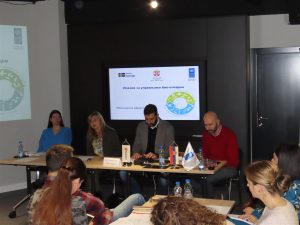
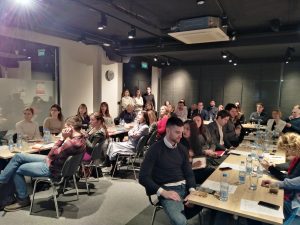
-
Public call for the support for Civil Society Organizations projects of environmental protection
Ministry of Environmental Protection of the Republic of Serbia published Public call for the support for Civil Society Organizations projects of environmental protection in 2020.
The goal of the Public call is to improve the environment protection within nature protection,
environmental entrepreneurship, civic activism, strategic and environmental impact assessment, air pollution and noise protection, climate change (reducing greenhouse gas emissions) and/or adaptation to changing climate conditions.
Deadline for applications is 20th February 2020.
More about Public call you can find on the link.
-
Jan 28 2020 Open call for participation in Summer School on Climate Action “Jorney 2020”
Applications for participation in the four-week Summer School on Climate Action, Innovation, System Transformation and Building a Community Committed to Combating Climate Change, EIT Climate-KIC “Journey 2020” are open until Monday, February 17, 2020.
The program is open for students, graduates, future MBAs, masters and PhD. Participants will stay in three locations in Europe, divided into five groups, from 28 June to 25 July, or from 2 to 20 August. They will have the opportunity to work in an international and multidisciplinary team to develop their ideas, projects, products or services with the support of experienced mentors.
Participation in the program is free. More information you can find on https://journey.climate-kic.org/contact-us-faqs. To apply you must fill out an online application form on https://journey.climate-kic.org
The school has been organized by the EIT Climate-KIC in cooperation with universities and other organizations since 2010, and so far, has involved more than 3000 graduates who have come up with around 400 project and business ideas. The Chamber of Commerce and Industry of Serbia has been implementing the EIT Climate-KIC programs: Accelerator, Pioneers into Practice, Climate Launchpad and Journey since 2016.
-
Dec 19 2019 The Annual Gathering of Climate Change Practitioners was held in Belgrade
More than 80 professionals from various fields in climate change gathered on Friday, December 13th for the annual networking meeting in MARSH Open Space in Belgrade, to present the results achieved on projects in 2019 and announce activities for next year.
– This is the third year that we are organizing such an event in cooperation with the United Nations Development Programme (UNDP), which is important for bringing people together from different programs to discuss, share experiences and plan future projects together. We all work in the same field and our goal is to fight climate change – said Advisor for Circular Economy at the Chamber of Commerce and Industry of Serbia Isabel Arias.
She introduced Climate-KIC, explaining it is the EU largest partnership organization that is supporting innovation that helps tackle climate change to achieve net-zero greenhouse gas (GHG) emissions. According to Arias, the strength of the organization lies in the huge network they have all over Europe in various areas, such as finance, cities, materials and land use, and they will begin to work in the topic of water. Partner organizations are companies, universities, chambers of commerce.
Ana Seke, „Climate Smart Urban Development Challenge“ Project Coordinator at UNDP Serbia, presented the realized activities, including public calls for innovative ideas and solutions, as well as the open data challenge.
– We chose the best ones, they won awards and went into a climate incubator. We awarded five projects and provided them with co-financing and implementation. Another 15 projects are participating in the climate accelerator and at the beginning of next year, we will select three more that will receive funding for implementation. In February 2020, we are expecting the new challenge call related to innovative solutions for biodegradable waste, which we will implement together with the Swedish International Development Cooperation Agency (SIDA) – said Seke.
She announced that platform for crowdfunding will be operative next year, and two campaigns of donation type crowdfunding are forthcoming for kindergarten in Kragujevac, as well as investment type crowdfunding for two solar power plants in Sabac. Project also supported the founding of the First energy cooperative in Sabac.
CleanTech Hub Manager at Startit Nemanja Milovic presented Inno Energy in Serbia that has programs for master’s degree students at major European universities, as well as other innovative programs that finance innovation projects in the field of climate change.
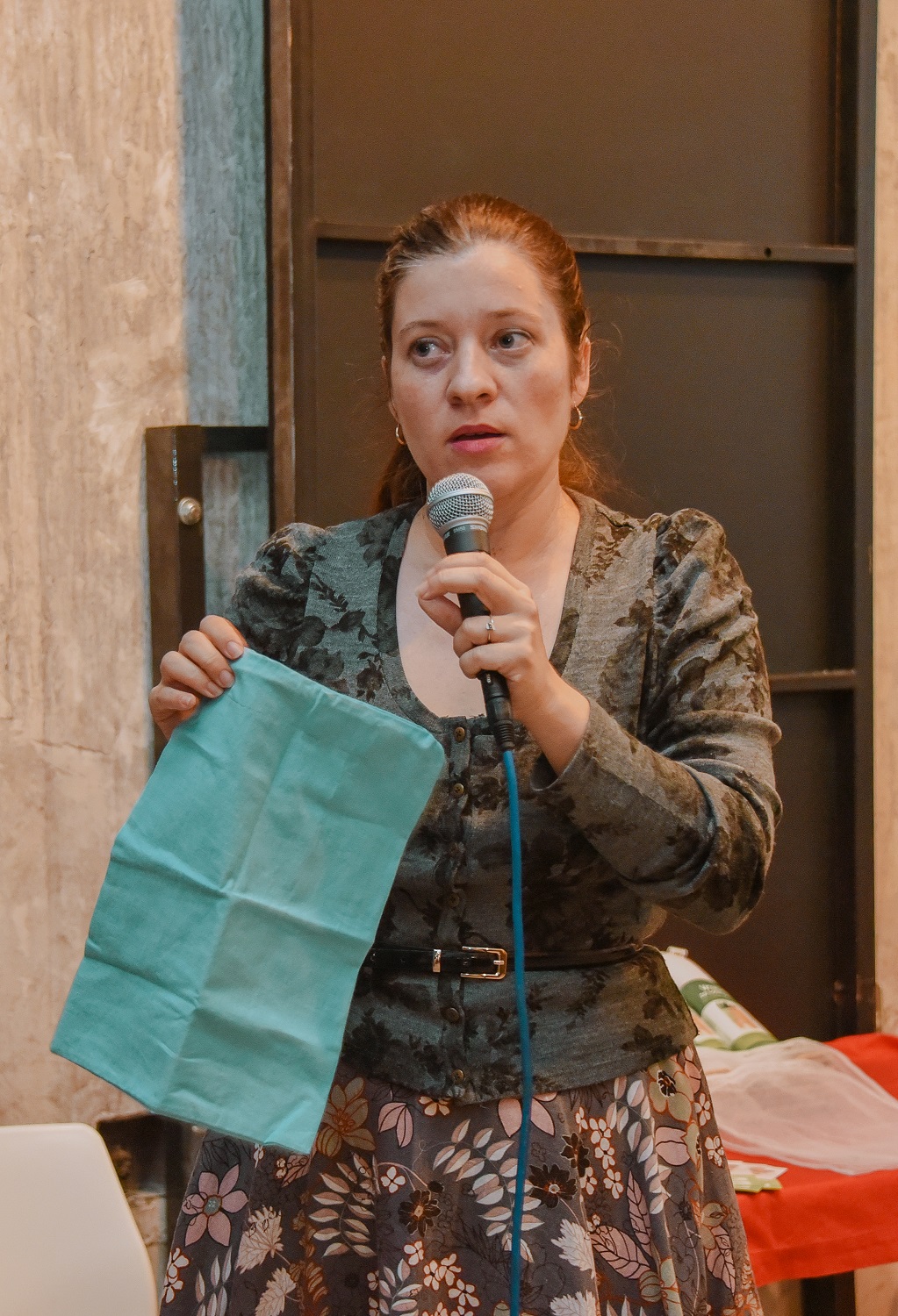
Presenting the principles of the zero waste movement and the circular economy, the administrator of the Facebook group “Zero & Low Waste Serbia” Milja Vukovic explained that she lives without waste for two years and that the time we are living in requires creative moves because species are being driven to extinction.
– There is clear data that says we are living in a special time and our oceans have several continents of floating plastic. Plastic in the natural environment is not neutral, its further effect is not zero. The plastic slowly decomposes, releases carbon dioxide and returns to the ecosystem through the animals that eat it – explained Vukovic, adding that the information influenced her to stop producing garbage and start communicating to others to do the same.
The participants of the networking meeting had the opportunity to attend an exhibition of some of the local products and creative solutions that replace plastic in everyday use, but also support the principles of the circular economy.

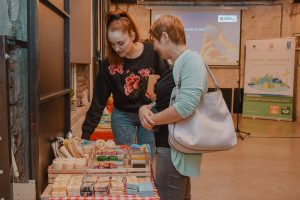
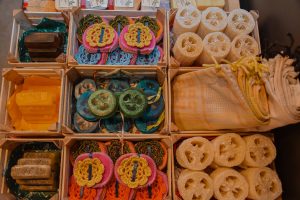

-
Nov 28 2019 This year in Serbia 300 kilometers of trucks full of special waste streams were recycled
New Law on Waste management soon will be adopted in Serbia, which will contribute to the sustainable development goals and enable to transfer part of the competence in this area the republic level to local self-governments, including the decision to ban plastic bags, announced the Minister of Environmental Protection Goran Trivan during event that mark The European Week for Waste Reduction on November 22 at the Museum of Science and Technology in Belgrade.
– The Waste Management Strategy has also been redefined and it is providing that we have 27 regional waste collection centres. We expect a series of changes that will show progress and when we make all the sites available, then the system of waste collection, treatment and reuse will come to life – Trivan said, adding that the Ministry has invested over 400 million dinars in the rehabilitation of non-sanitary landfills.
He pointed to the shortcomings of the existing Law, which does not provide a deposit system for packaging waste management.
– For the end of this year, we are preparing a document that will regulate the process of packaging waste treatment, which means that we will apply the experiences of countries that had great and good results and raise our goals to the level of EU targets – Trivan said.
According to the president of the Association of Recyclers of Serbia Vladimir Živaljević, since 2010. until today 600,000 tons of special waste streams have been processed in Serbia.
– This year, 100,000 tonnes or 100 million kilograms of special waste streams were processed. That’s 300 kilometres of trucks full of such a waste. It is easy to imagine how this has been around us for years – Živaljević said.
As he explained, waste oils are the big problem because is not known where they end up after use.
– There are 50 million litres of such waste oil in Serbia, for which is not known where it ends up, it is used in combustion plants and as a fuel in cars, so we have aerial pollution and carcinogens in nature. The solution is the „polluter pays“ principle. According to that principle, the polluter should pay for the rehabilitation of the polluted environment. This principle has shown results in the last few years and it provides significant stimulus for further progress in this area and according to the capacity, 20 to 30 per cent more waste could be processed than the current result – Živaljević explained and added that less than 2,500 companies have permits for some type of storage, transportation and waste treatment.
– We have 20 large operators, there are currently 1,000 workers in the industry and more than 15,000 workers in various companies that are subcontractors of these operators – Živaljević said.
Ambassador of the Kingdom of Sweden to Serbia Jan Lundin welcomed the great efforts of numerous municipalities in Serbia to reduce waste and recalled the numerous projects implemented by the Embassy in cooperation with the Republic of Serbia, in particular, the project with 17 municipalities in Serbia that have primary waste separation.
Ambassador of the Republic of Turkey Tanju Bilgic recalled the initiative launched in cooperation with the Ministry of Environmental Protection launched in Serbia „Zero Waste“.
The European Week for Waste Reduction is an international initiative that supports actions every year across Europe for one week, aiming to promote waste reduction and to raise public awareness of waste as a resource.

